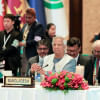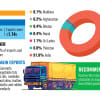Tarana for tax cuts on handset imports
The Telecom Division yesterday urged the finance ministry to review the tax structure on mobile handsets and accessories to make smartphones more affordable and boost internet use.
State Minister for Telecom Tarana Halim said she sent a proposal to the ministry two weeks ago.
She spoke at an event, ‘Mobile Handset and its Role in Building Digital Bangladesh’, organised by the Telecom Reporter’s Network Bangladesh at the Westin hotel in Dhaka.
“I requested the finance ministry to withdraw the tax and VAT on mobile accessories, to promote the local assembly of smartphones.” However, she is yet to receive a positive response from the finance ministry.
Imposing such a surcharge hinders digitisation efforts, Tarana said.
Terming smartphones as the main component toward building a more digital society, Tarana said the sector’s contribution to the economy would increase if tax and VAT on mobile handsets are slashed. She also urged mobile phone importers and service operators to offer monthly instalment payment options on handsets for customers.
“We have no alternative to offering instalment facilities on handsets, if we want to increase internet penetration,” she said.
To allow for handset models locked to particular operators, some changes must be made to the existing regulations, said Shahjahan Mahmood, chairman of Bangladesh Telecommunication Regulatory Commission.
Currently, mobile operators cannot import handsets, but if they were allowed to make joint arrangements, handset prices would drop by 15 percent to 20 percent, said Mahmud Hossain, chief corporate affairs officer at Grameenphone.
“Allow locking of handsets to an operator for 2-3 years so smartphones can be offered with special bundles for the subscribers,” Hossain said.
Mahmood asked handset importers to submit a proposal on reviewing VAT and tax immediately, so they can take appropriate measures to promote the industry.
Currently, there is a 25 percent tax on handset imports and around 60 percent tax on different accessories, which present no business case for the entrepreneurs to establish assembly plants, said Ruhul Alam Al Mahbub Manik, president of Bangladesh Mobile Phone Importers Association.
Abu Saeed Khan, senior policy fellow at Colombo-based LIRNEasia, said a high tax on handsets and accessories is an incentive for smuggling to flourish.
Referring to research by different global organisations, Khan said Bangladesh will acquire five million new mobile connections every year for the next five years. “Is the regulator or the government ready to regulate the market?”
The National Board of Revenue needs specific proposals from investors to review tax and VAT structures on imported handsets, said Moinul Khan, director general of Customs Intelligence and Investigation Department.
He said the IMEI (international mobile equipment identity) number, or the 15- or 17-digit code that uniquely identifies mobile handsets, would solve all the problems regarding security and counterfeit handsets.
The commission has initiated a six-month pilot project to monitor legal handset imports and later, it would move to register handsets, said Col Nasim Parvez, BTRC's director general on spectrum management.
Bangladesh would be a huge market if at least one smartphone could be ensured for each of the country's nearly 8 crore unique mobile users, said BMPIA General Secretary Rezwanul Hoque said.
“A master roadmap is needed to address where we want to go in the next few years.”
There are currently only 1.5 crore smartphones in the market and it has enormous prospects if the tax regulation is okay with the importers, Hoque added.
Some 1.6 crore mobile handsets have been imported so far at an estimated cost of Tk 1,970 crore and the government has earned a revenue of Tk 422 crore from it, said Lutfur Rahman, commissioner of Dhaka Customs House.
TRNB General Secretary Shamim Ahmed presented a keynote paper, while President Rashed Mehdi moderated the discussion.

 For all latest news, follow The Daily Star's Google News channel.
For all latest news, follow The Daily Star's Google News channel. 







Comments